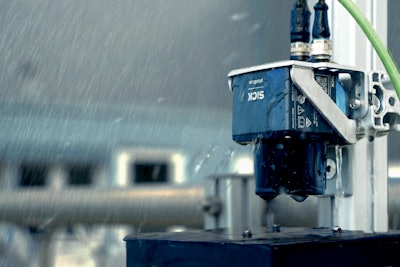
Modern manufacturing facilities demand unprecedented levels of efficiency and precision. As Industry 4.0 transforms production environments, autonomous mobile robots (AMRs) have emerged as critical assets for maintaining competitive advantage. These intelligent machines excel at repetitive tasks while freeing human workers to focus on higher-value activities, but their success hinges on one crucial capability: knowing exactly where they are always.
The challenge isn't just about positioning—it's about delivering actionable data in real-time. Enter the picoScan120, a revolutionary LiDAR sensor that transforms how indoor mobile robots perceive and navigate their environment. This sophisticated yet compact solution bridges the gap between advanced robotics and practical industrial implementation.
Addressing Real-World Manufacturing Challenges
Factory floors present unique navigation obstacles that outdoor autonomous vehicles never encounter. Unlike open roads with clear lane markings, industrial environments feature constantly changing layouts, narrow passages between equipment, and dynamic obstacles including personnel, forklifts, and temporary storage areas.
Traditional navigation solutions often fall short in these demanding conditions. The picoScan120 addresses these limitations head-on with its intelligent design architecture. Its space-efficient pigtail configuration enables integration into even the most compact AMR platforms, while its robust sensing capabilities ensure reliable operation in challenging industrial conditions.
Manufacturing teams implementing AMR fleets equipped with picoScan120 technology report significant improvements in material handling efficiency. These robots seamlessly transport components between production stations, maintaining consistent throughput while reducing human exposure to repetitive lifting and carrying tasks.
Precision Navigation Technology
The picoScan120's technical specifications reveal why it excels in complex indoor environments. Its impressive 30-meter detection range provides AMRs with comprehensive situational awareness, allowing them to plan optimal paths well in advance of potential obstacles. This extended sensing capability proves particularly valuable in large warehouse environments where robots must navigate between towering storage racks.
What sets this sensor apart is its exceptional angular resolution of 0.1 degrees. This precision enables robots to detect subtle geometric features essential for accurate contour following and precise docking maneuvers. Whether navigating tight warehouse aisles or approaching delicate assembly stations, AMRs equipped with picoScan120 technology maintain consistent accuracy.
The sensor's advanced algorithms excel at detecting objects with varying reflective properties. While most targets remain visible at the full 30-meter range, even challenging dark surfaces with low reflectivity can be reliably detected at distances up to 18 meters. This versatility ensures consistent performance across diverse industrial environments.
Engineering Excellence in Compact Form
Industrial automation demands solutions that maximize performance while minimizing spatial requirements. The picoScan120 exemplifies this philosophy through its thoughtfully engineered compact design. By reducing integration space requirements, it enables deployment of smaller, more agile AMR platforms capable of accessing previously unreachable areas within manufacturing facilities.
This design philosophy extends beyond mere size optimization. The sensor delivers enterprise-grade performance while maintaining cost-effectiveness that appeals to budget-conscious operations. Its balanced approach to features and pricing makes advanced LiDAR technology accessible to a broader range of manufacturing applications.
The result is enhanced operational flexibility. AMR platforms incorporating picoScan120 technology can navigate through tight spaces that would challenge larger systems, opening new possibilities for automation in space-constrained environments.
Streamlined System Integration
Modern manufacturing relies on interconnected systems that share data seamlessly across operational networks. The picoScan120 anticipates this requirement through its advanced connectivity architecture. Built-in Ethernet connectivity enables direct integration with existing plant networks, while the sophisticated REST API interface simplifies software integration tasks.
IT departments particularly appreciate the sensor's remote management capabilities. Headless firmware updates ensure AMR fleets remain current with the latest features and performance optimizations without requiring individual robot downtime. This capability proves invaluable for maintaining large-scale deployments across multiple facility locations.
The sensor continuously streams measurement data, providing real-time insights into robot positioning and environmental conditions. This data flow supports advanced analytics applications that can optimize routing algorithms, predict maintenance requirements, and identify operational efficiency opportunities.
Transforming Industrial Operations
The picoScan120 represents more than incremental improvement—it enables fundamental transformation of how manufacturing facilities approach automation. Its plug-and-play design philosophy eliminates complex configuration procedures, allowing rapid deployment across diverse applications.
These operational improvements compound over time, creating sustainable competitive advantages for organizations that embrace advanced localization technology. The picoScan120 doesn't just enhance existing processes—it enables entirely new approaches to manufacturing automation that were previously impractical or impossible.
As manufacturing continues evolving toward fully autonomous operations, solutions like the picoScan120 establish the technological foundation necessary for success. By combining precision sensing, intelligent connectivity, and practical design, it sets new standards for what's possible in indoor mobile robotics.